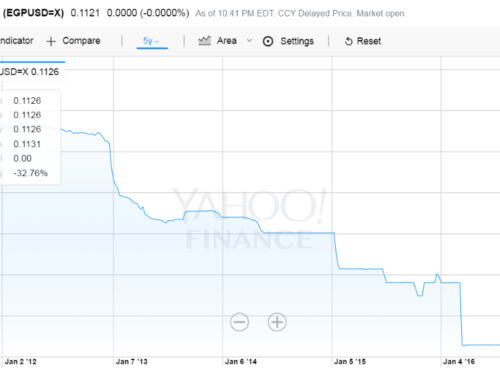Originally posted on FP transitions, and I forgot to post it here..

This week I attended two events in Cairo devoted to Egypt’s economic situation, but the setting could easily have been any point in the decade prior to the January 2011 revolution — for better or for worse.
The first was a “graduation” ceremony for a group of tech startups from an incubation cycle, allowing the groups to present their projects to the media and potential investors in a fancy Cairo hotel ballroom. Solvermine is setting up a network system for major companies to contract freelance scientists to resolve issues and questions the companies face. Yadaweya is creating an online store for Egyptian handicrafts; each piece of works comes with information about the craftsperson and the region it originates from — thus selling not only the piece of work but also the story behind it — creating an added value. AStarApps offers services to iPhone application developers, circumventing some of Apple’s most annoying restrictions for beta testing. Integreightis designing smart, educational electronic circuits, and have already secured interest from universities around the world. And, as always, there’s one guy trying to create the next Farmville, again.
The event was a private initiative. The incubator, Flat6Labs, is the brainchild of venture capitalistAhmed El Alfi, who invests in the companies he helped nurture — putting his money where his mouth is.
This project mirrors the response I’ve always gotten from technology entrepreneurs in Egypt — whether before or after the revolution — whenever I’ve asked what policy they believe the government should pursue to support them. The answer, invariably, is, “Just leave us alone.”
Suffering from an already unclear and insecure support policy from the state, SME development has “simply fallen off the government’s priority list,” according to a former senior employee at the Ministry of Finance with whom I recently spoke.
And in a sector with needs and challenges that are often light-years beyond lawmakers’ concerns (and understanding), the online and technology community in Egypt has been building its own ecosystem, with linkages and support network that are non-existent in other sectors. Incubators, startup competitions, and boot camps have served to cement a mentor-mentee mentality, where members support one another, professionally and often financially, and where local venture-funding severs as the main source of external funding for technology startups.
The second event was an all-day conference organized for the launch of the Egyptian National Competitiveness Report. With a speaker’s list comprising the prime minister and half of the cabinet, it was a veritable who’s-who lineup of influential individuals in Egyptian investment policy-making.
The technical content and presentation were overall lacking. Though organizationally flawless, the event was one of the all-too-usual occasions for the government to display its grand and somewhat delusional self-image, boosted by the polite silence of the private sector audience, which could be seen shaking its head in disapproval. When problems were broached by audience members, they were addressed as something inherited from the previous government (influenced by too many U.S. political debates, perhaps?). They overall ignored the terrible mismanagement of 2011 and 2012 and the irresponsible squandering of global goodwill after the January 2011 revolution.
The closing session was an unadulterated chorus of “all is well,” and “we are doing great,” with various government portfolio-holders nodding vigorously in accordance — the only vigorous thing they’ve done since being in power. The only private voice on the panel, an investment banker, pointed out that Egypt’s ratings have been falling for the past two years — the four ministers also on the panel simply played deaf.
The prime minister’s remarks, which at first seemed disarmingly candid, rapidly became as delusional as those of the other cabinet members. Speaking of billions in “pledges” for investment and budget support, he went on to list the many countries and companies expressing interest in investing in Egypt as it if were a done deal.
For better or worse, much about government economic policy and practice has failed — or refused — to change since the Egyptian revolution.
Some things are different, though. Moderators have become more incisive towards government representatives; the audience asked tougher questions; and representatives from Islamist parties, once unofficially banned from such events, made a strong show both on the panels and in the audience.
But if the economy is ever to recover, deeper changes — not just cosmetic ones — need to be implemented. The government in particular needs to face the facts, shed unnecessary optimism, and act accordingly.
In the meantime, entrepreneurs will keep their heads down and carry on building small but great companies. Even if they choose to keep to private initiatives, policymakers need to guarantee the proper institutional and legislative environment to help them flourish.



